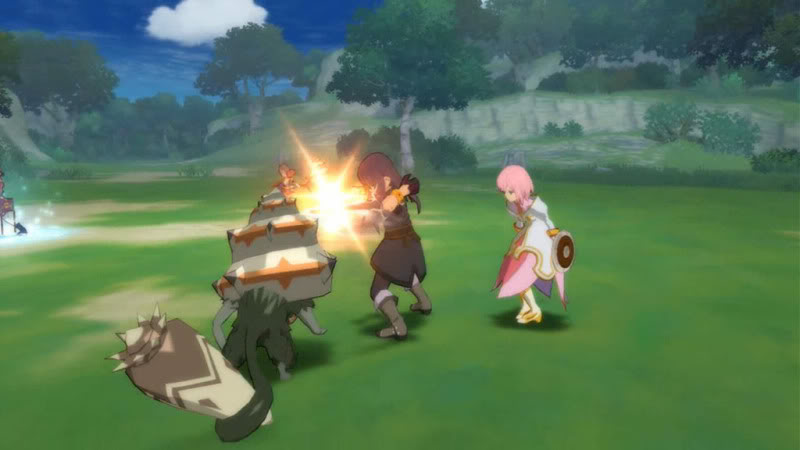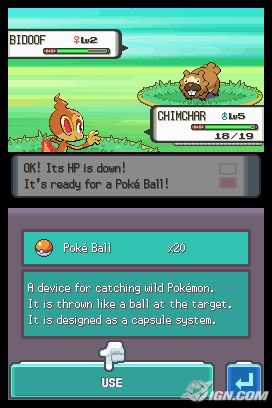 Toby Davis: Tonight, Brian and I are going to bounce around ideas regarding character movement in RPG battles. Let's head to the battlefield!
Toby Davis: Tonight, Brian and I are going to bounce around ideas regarding character movement in RPG battles. Let's head to the battlefield!
Brian: Role-playing-games have transformed during this console generation due to rising development costs, more Western RPGs on consoles, and a fragmented console market with ever-changing tastes. Developers are having a difficult time finding a sizeable audience, and we're seeing fewer 40-hour opuses as a result. Are you happy with the contemporary RPG market?
Toby: The current RPG market makes me happy, but its new battle-systems are getting to me.
Brian: So perhaps these changes are too drastic?
Toby: I think a lack of consistency is the bigger issue. For example, White Knight Chronicles allows you to move on the battlefield, while Final Fantasy 13 only lets you select an attack and a target. Lacking the ability to move makes sense in remakes, but I think player-controlled movement should now be standard.
[embed:http://www.youtube.com/watch?v=Bgbwn8ElXZU&feature=related ]
Brian: As someone who appreciates movement during combat, what's your perspective on Final Fantasy 12 — a game that gives you complete control over a character?
Toby: Final Fantasy 12 was a nice time when controlling the character in battles. Even though you had to stop to cast a spell, it was still possible to move around and strike the enemy from any angle.
Eternal Sonata also allowed you to do this, and it made you feel more in control of battles.
Brian: I appreciated having the ability to move in those games as well, but I would have preferred a fully real-time system. Maybe I'm old-school, but I find Secret of Mana-style instantaneous action much more appealing than MMO-inspired combat.
Toby: But wouldn't a real-time battle system make traditional Japanese RPGs feel more like Mass Effect and Alpha Protocol?
Brian: There would definitely be similarities. I don't think I'd mind this action-oriented approach, but sometimes I also like tactical turn-based systems such as Final Fantasy 13's Paradigm System. What did you think of the somewhat jarring change in the latest Final Fantasy?
Toby: Controlling one character in Final Fantasy 13 was a letdown. I appreciated having some control over the AI, but I don't think this type of system will be used in many future RPGs.
Do you ever see us controlling more than one character in future RPGs or at least being able to choose their abilities?
Brian: Definitely. I think the Tales and Star Ocean series will continue with their single-character approach, but Square-Enix will probably continue to alter its Final Fantasy series and borrow from older entries on occasion. Many console role-players enjoy controlling their entire party, so I think we'll at least see some nostalgic games similar to FF9 that will appeal to more traditional JRPG fans.

What do you think of the Tales series and its reliance on ally AI?
Toby: I only played Tales of Vesperia for the Xbox 360 before I had one too many Red Rings of Death and switched to the PS3, Wii, and PC. Vesperia was fun, in part, because my character could move during battle. I generally don't mind AI-controlled characters as long as they act appropriately in battle.
What's your opinion on the way developers use AI in battle situations?
Brian: In Gamecube-era Tales titles and beyond, the AI streamlines combat thanks to smart character decisions, but it really hurts the experience when your allies clumsily run into devastating spells in games such as Star Ocean: Till The End of Time.

Final Fantasy 13 is another example of generally competent ally AI, but you'll curse when they cast 'Deshell' during a moment when you could have used 'Deprotect.'
Toby: I appreciate the method used to switch characters in White Knight Chronicles. The AI takes over a previously-controlled character, so it's fairly free-flowing. I agree that RPG ally AI is not always the best, but most handle automated characters better than Final Fantasy 13.
Brian: That's nice that the transition is smooth. As long as the AI can make optimal decisions (or at least ones that are competent), I don't mind.
Toby: You would like White Knight.

Brian: The combat certainly sounds interesting.
Knowing that you're a fan of the Mother series, what's your take on the combat in Earthbound and Mother 3?
Toby: Earthbound's battle system is great considering the console it's on. It's easy to understand and follow without being overly complicated.
That fighting style wouldn't be a good fit for Final Fantasy, Diablo or any RPG that appeals to the graphics-hungry, but I support it in games such as the Pokémon series, which is still going strong on Nintendo handhelds.
Brian: I've always felt that Earthbound's battle-system is a bit slow and archaic, but it cleverly altered traditional Dragon Quest combat by allowing players to heal by including rolling health that prevented instant deathblows.

As for Pokémon, I think it already has enough substance with its rock-paper-scissors-style gameplay involving various elemental Pokémon. However, I'm curious: Do you think adding more than one monster to battles would make for more strategic combat?
Toby: You can actually already do that in the latest Pokémon, which allows you to have 2 on 2 battles. It doesn't detract from the experience; it just adds more strategy.
As you said earlier, Pokémon has the best rock-paper-scissors method in RPGs, but do you think a lot of other RPGs force you to act as a tank?
Brian: Some RPGs mostly require brute force, and leave spell-casting and strategy for boss fights. These types of games tend to have relatively few magic-replenishing items, which makes battles mundane and repetitive.
Do you prefer breezy combat a la Chrono Trigger, or would you rather have lengthy, strategic battles?
Toby: Now when you say "lengthy, strategic battles" do you mean ridiculously long battles such as Final Fantasy 11's three-hour boss encounters?
Brian: I wouldn't wish that type of punishment on anyone. I had two-minute fights in mind as opposed to 30-second long encounters.
Toby: I think boss battles should at least last five minutes. It's rewarding fighting enormous foes that require you to give it your all. However, some games such as 3D Dot Heroes are making me yearn for brief encounters.
Brian: I agree that bosses should be challenging, but it's annoying when developers replace strategy with monotonous level-gaining. What's your take on bosses that require grinding?
Toby: The way I look at it is when there's a battle you can't win within 5-10 minutes, it really shouldn't be there.
Brian: I feel similarly. I often find myself enjoying a game, only to be slaughtered by a ridiculous boss towards the end because my character levels are too low. Star Ocean: Till The End of Time and Dragon Quest 4 are prominent examples of this design flaw. The latter forced you to fight 7 bosses in a row that probably tempted numerous gamers to chuck their dual-screened portables or NES carts.
Toby: On that note, I think our battles are finally over. This was a great RPG battle discussion.
Brian: Yes indeed. Thanks for inviting me to be a part of this discussion, Toby!
VentureBeat's mission is to be a digital town square for technical decision-makers to gain knowledge about transformative enterprise technology and transact. Learn More
